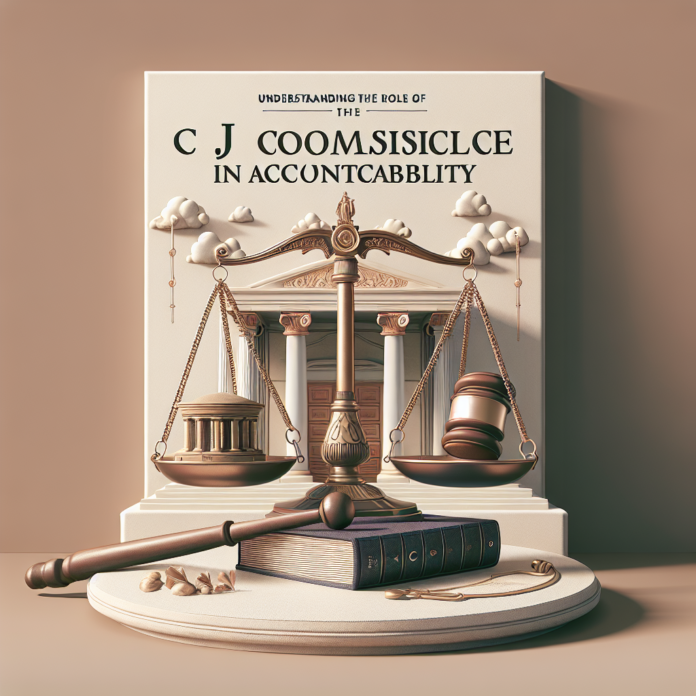When we talk about the pillars of democracy, the judiciary forms an essential part. It is the seat of justice, a body that is entrusted with the responsibility to uphold law and justice and simultaneously safeguard the constitutional rights of citizens. However, the ability for the judiciary to execute these roles efficiently depends greatly on judicial accountability, a concept bound with transparency, independence, and sincerity within the judicial system.
One crucial entity that plays a pivotal role in achieving this objective is the CJ Commission. The need to understand this role is paramount because it reflects the ethos of maintaining justice and balance in society.
What is the CJ Commission?
The CJ Commission refers to the Chief Justice Commission. Its precise structure, objectives and functioning might vary from one jurisdiction to another, however, its fundamental role is usually centric on fostering judicial accountability and independence.
The Historical Objectives of the CJ Commission
The CJ Commission was initially established with the objective to evaluate the performance of judges. With time, it extended its domains to consider cases related to judicial misconduct and recommend necessary disciplinary actions. It emerged as a tool to incorporate accountability in the judiciary and ensure that judges performed their tasks with optimum honesty, sincerity, and transparency.
The Role of CJ Commission in Judicial Accountability
Over the years, the function of the CJ commission has evolved, and it has come to embody a pillar of judicial accountability. The commission is tasked with an array of responsibilities that are essential for boosting integrity, transparency, and work ethics in the judiciary.
The CJ Commission plays a vital role in evaluating the performance of judges. It is a relevant organ that ensures that judges stick to their roles and responsibilities and maintain a high standard of professionalism in their conduct. It also takes action on reports involving complaints against judges, making sure that appropriate measures are implemented to rectify the situation.
Additionally, the CJ Commission marks an important position in maintaining judicial independence. It works to insulate the judiciary from potential influence or interference from other branches of the government thus securing the judiciary’s role as the impartial executor of law and justice.
How the CJ Commission Ensures Judicial Accountability
The CJ Commission executes a mechanism that utilizes transparent assessment to account for how a judge performs his or her duties. The process involves constant evaluation of judges’ work, investigating lodged complaints, conducting hearings, and recommending required disciplinary action wherever necessary.
In essence, this mechanism ensures that the judges are held accountable for their actions and decisions. It facilitates the process of removing any sign of bias, corruption, or any other form of injustice within the system. By doing so, it ultimately safeguards the citizens’ faith in the judiciary, promotes the rule of law, and protects the democratic values ingrained in the country’s constitution.
Conclusion
In conclusion, the CJ Commission plays a significant role in maintaining judicial accountability, which is a crucial requirement for upholding the rule of law and sustaining democracy. It performs the quintessential task of evaluating judges’ performance, ensuring their independence, and rectifying cases of misconduct. Understanding the role of CJ Commission is essential to comprehend how integrity, transparency, and accountability are preserved in the judicial system, thus ensuring a just and fair process for all citizens.
FAQs
- 1. What is the main role of the CJ Commission?
- The main role of the CJ Commission is to evaluate the performance of judges, maintain judicial independence and rectify misconduct cases in the judiciary.
- 2. How does the CJ Commission contribute to judicial accountability?
- The CJ Commission ensures judicial accountability by regularly evaluating judges’ performances, handling complaints against judges, and recommending appropriate disciplinary action when necessary.
- 3. Why is the role of CJ Commission important in a democracy?
- The role of the CJ Commission is essential in a democracy because it upholds the rule of law by ensuring judicial independence and accountability.
- 4. What mechanisms does the CJ Commission use to maintain judicial accountability?
- The CJ Commission utilizes mechanisms such as continuous evaluation of judges’ work, investigation into complaints, conducting hearings and recommending required disciplinary actions to maintain judicial accountability.
- 5. Aside from handling complaints against judges, what other roles does the CJ Commission perform?
- Aside from handling complaints, the CJ Commission also assesses judge’s performance and safeguards the judiciary’s independence from interference or influence from other branches of the government.

